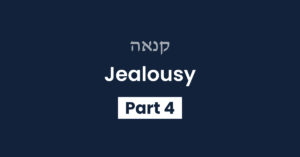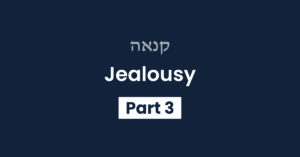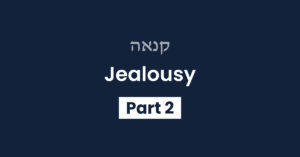The yamim tovim have passed, and we are now in the month of Cheshvan. A famous date coming up soon is the 11th of Cheshvan, which is the yahrtzeit of Rachel Imeinu.
Last year, we discussed how Rachel Imeinu excelled in the middah of silence – she stayed quiet so as not to embarrass her sister, Leah. This year, we will take a look at another middah which Rachel Imeinu displayed during this time, and that is her ability to overcome her jealousy of her sister. Rachel was supposed to marry Yaakov, but Lavan tried to trick Yaakov into marrying Leah instead. Rachel could have stopped this from happening, but she overcame her jealousy in order to avoid embarrassing her sister.
In fact, the Midrash1 teaches us that Rachel’s tremendous act of selflessness here was so great that in her merit, the Jewish people will ultimately be redeemed from exile and return to the land of Israel. Clearly, the ability to overcome feelings of jealousy is something very powerful indeed.
This month, we will iy”H take a deeper look at jealousy and try to understand: Where does jealousy come from? What is the root of jealousy, and how can we overcome it?
The Root of Jealousy
Jealousy begins when we notice that there is something we are lacking, while someone else is enjoying that very same thing we wish we had. We tend to believe that if my friend is enjoying this gift, skill, or success, then I deserve to enjoy it also.
We tend to believe that if my friend is enjoying this gift, skill, or success, then I deserve to enjoy it also.
For example: My friend earns so much money at her job, and I get paid such a tiny salary that barely covers the cost of a babysitter for my kids. My neighbor has a huge gorgeous house and I am stuck in a tiny apartment. My classmate is so brilliant, whereas it takes me hours of studying to remember even half of what he remembers with zero effort.
Sometimes, this pain can be so deep that we might even wish that our friends would lose whatever talents, gifts, or possessions they have, simply because their enjoyment reminds us of what we are painfully lacking.
What should we do when we feel this way?
First, we can simply recognize that we are feeling this way, and acknowledge that it is normal. Hashem created each of us with desires and motivations to acquire things in this world, so that we will work hard to achieve everything that we need to achieve. This desire to acquire more and more stems from a natural human desire to always be growing and achieving. As the Midrash2 states: “When a person dies, he will have barely acquired even half of what he wanted to acquire.” Human beings are naturally always yearning to grow, achieve, and acquire more.
Once we have recognized that our feelings are normal, we can take a step back and ask ourselves whether our line of reasoning is really true. Just because my friend is making a six-figure salary, does that mean that I need to be earning that much money, too? Just because my friend has a huge house, does that mean that I need to have a huge house, too? Just because my friend is brilliant and smarter than everyone else, does that mean that I need to be that way, too?
Every Person Is Unique
The answer is that this is not necessarily true at all. Hashem created every person in a unique way, in order that they should be able to fulfill a unique purpose on this earth. Maybe Hashem gave your friend a lot of money so that she can struggle with the challenge of giving money to tzedakkah versus keeping it for herself. Maybe Hashem gave your neighbor a huge house so that he can learn to push himself beyond his comfort zone and host guests more than he would naturally like to. Maybe Hashem made your classmate brilliant so that he can one day become a rebbe and teach Torah to thousands of students in a clear way.
Hashem created every person in a unique way, in order that they should be able to fulfill a unique purpose on this earth.
Hashem gave each of us a different set of “tools” in order to help us fulfill our unique purpose in life. The tools that are right for my friend are not right for me.
Rav Dessler3 gives a mashal (parable) to explain this concept: If your friend has a pair of glasses, does that mean it would be good for you to have glasses also? Of course not! If your friend has worse eyesight than you have, then his high-prescription glasses would be not only useless to you – they would be actually hurtful to your eyes! Similarly,4 if your friend has a nice suit, does that mean you deserve to get the exact same suit? Of course not – he is a different height and weight from you, so his suit would not “suit” you at all (pun intended)!
This is the perspective that we must have on everything that we were given in life: What’s right for my friend is not necessarily right for me. Perhaps it wouldn’t suit me to have a six-figure salary, a huge house, or a high IQ, if these are not part of my role in life. Perhaps I need a different set of tools in order to fulfill my own unique purpose on this earth.
What’s right for my friend is not necessarily right for me.
Maybe Hashem gave me a smaller salary so that I will be forced to think harder about how I spend money, and make sure to prioritize ruchniyus needs like kavod Shabbos over other less-spiritual expenses. Maybe part of my tafkid in life is that Hashem wants me to work on my patience and tolerance, so He gave me a small house so that I will have to learn how to remain calm and patient even in small crowded spaces. Maybe Hashem gave me a weaker memory so that I will be forced to review my learning more often, and thereby earn tremendous schar (reward) for toiling in Torah.
We can’t ever know for sure why Hashem gave us this kind of house, this set of parents, or these kind of personal challenges. But we do know for sure that everything Hashem does is for a good reason, and it is done with a purpose and for our benefit. Hashem has infinite wisdom, and He definitely knows what He’s doing!
When we recognize this, we can begin to let go of our jealousy of other people. Yes, he might have a bigger house, fancier car, or stronger memory. Yes, she might have a nicer sheital, calmer kids, or more cleaning help than I do. But so what? That doesn’t make him or her any better than I am – it just means that these are the tools Hashem decided that they need in order to fulfill their purposes in life. They need these tools, but I need a different set of tools, and that’s just fine.
This week, let’s practice letting go of our thoughts of “I deserve” and “I should have.” Let’s remind ourselves that everyone is different and we were all given a different set of tools in order to fulfill a different unique role in Hashem’s master plan for the universe.
Sources: [1] Midrash Rabbah Eicha Pesichta 24; [2] Koheles Rabbah 1:13; [3] Michtav Mei’Eliyahu Vol. I. pg. 136; [4] Michav MeiEliyahu Vol 1. pg. 136
Your Challenge
Once a day, thank Hashem for 1 tool that He gave to you, and 1 tool that He gave to someone else.
You can try to make up a reason why Hashem MIGHT have given you and your friend these tools, even though we will never know what Hashem’s true reasoning is.
FOR EXAMPLE:
Thank you Hashem for giving me alarge housewhich I can use to host guests… and thank you for giving my neighbor a swimming pool in her backyard so that she can give all the kids a fun time in the summer.
Torah Questions
- What did the brothers see that made them feel jealous of Yosef? (See Bereishis 37)
- What did Moshe Rabbeinu do in Bamidbar Chapter 11 in order to prevent jealousy among the 12 tribes? (See Rashi on Bamidbar 11:26)
- What did King Shaul hear that made him feel jealous of Dovid? (Shmuel I 18:7)
- Pirkei Avos 4:21 says that jealousy is one of 3 middos that “remove a person from this world.” What are the other 2 middos?
- In the times of Mashiach, the Navi predicts that 2 tribes will no longer be jealous of each other. Which 2 tribes is it? (See Yeshayahu 11:13)
Questions to Ponder
- Pirkei Avos 4:21 says that jealousy is one of 3 middos that “remove a person from this world.” What do you think it means that jealousy “removes a person from this world”?
- The Gemara says that eating breakfast in the morning helps alleviate feelings of jealousy, and puts love in its place. How could this be? What does eating breakfast have to do with feeling jealous?
- The Sheim Mishmuel writes that when the Jewish people are unified, then we will feel less jealous of each other. How do you think unity helps alleviate jealousy?
- Rav Tzadok HaKohen writes that ta’avah (lust/desire) and kinah (jealousy) are the negative forms of chessed (kindness) and gevurah (strength/the ability to resist). What do you think this means?





